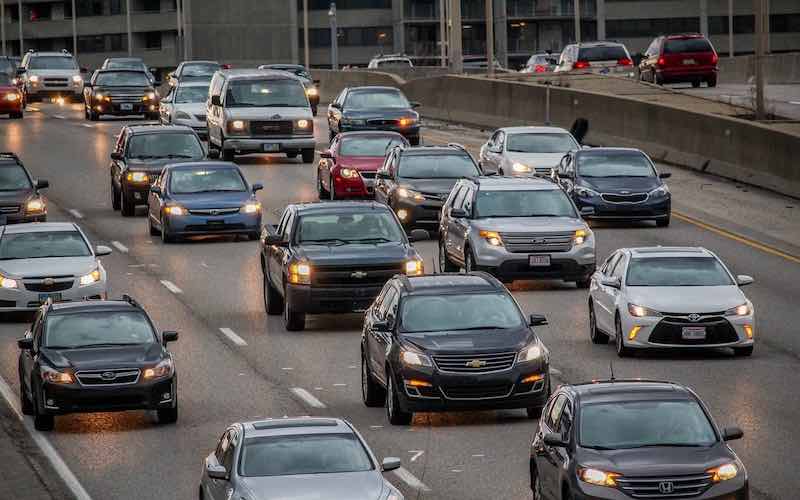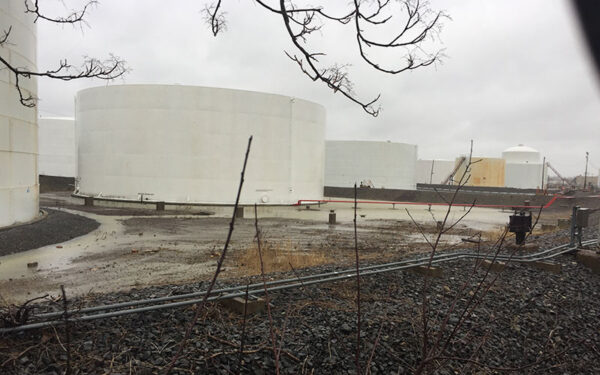
Since transportation is the largest, single source of polluting emissions in New England, these three bills can help protect our climate – if we can make them stronger.
Transportation is the biggest source of planet-warming emissions in New England – which means we need to urgently overhaul how we move people and goods. Doing so also allows us to address decades of inequities imposed by transportation and the climate crisis on communities across the region.
Those inequities include air pollution and the dangerous heat island effect, among other climate impacts – as well as lack of access to transportation options. Limited English-speaking households and Black and Brown communities experience these burdens significantly more than whiter and wealthier communities. As states decide how to reduce transportation pollution, the most burdened communities must be able to influence those decisions.
Over the next ten months, legislators in three states – Connecticut, Rhode Island, and Massachusetts – will consider bills to implement a multistate plan called the Transportation and Climate Initiative (TCI). Last December, governors in the three states signed onto the plan, which aims to cut emissions from cars, trucks, and buses. As written, that agreement falls short of actions necessary to meet the transportation and climate needs of limited English-speaking households and Black and Brown communities.
To improve TCI’s shortcomings, CLF advocates are focused on strengthening the three state bills. We want guarantees that more than half of the funds raised through TCI will be invested in overburdened and underserved communities. We also want to ensure the bills reflect our community partners’ demands.
Here are our top priorities for strengthening the three TCI bills – and how you can help.
Connecticut
What the Bill Would Do
Under state law, Connecticut cannot implement TCI unless it passes legislation. Connecticut’s bill, Senate Bill 884, would authorize the state to implement TCI and:
- establish an Equity and Environmental Justice Advisory Board to advise decisionmakers about TCI to yield meaningful improvements in clean transportation and air quality;
- require at least 50% of TCI funds to be spent in communities that are overburdened by air pollution or underserved by transportation;
- create a separate account for TCI funds to ensure that program funds are only used for their designated purpose to promote clean transportation and improve air quality.
The Connecticut legislative session ended last June without a vote on the bill. But we expect the legislature to take up TCI in a special session this fall or during the regular session next year.
What We Are Advocating For
We are working with other environmental and equity groups in Connecticut to strengthen the bill. Proposed amendments include: increasing the advisory board’s authority and independence, expanded air quality monitoring and pollution targets to improve air quality in overburdened communities, and fair labor standards for projects funded by TCI.
What’s at Stake
Transportation accounts for 38% of Connecticut’s greenhouse gas emissions—more than any other sector of the economy. Many communities suffer from vehicle pollution and inadequate access to transportation. Connecticut has pledged to reduce this pollution and invest in clean transportation. The state must follow through with equitable investments that improve air quality and lower emissions, increase access to clean and affordable transportation, and prioritize the needs of overburdened and underserved communities.
What to Watch For
Equity and cost will be key factors. Republicans uniformly oppose TCI. Most Democrats support it, but want to ensure TCI does not burden low-income people with higher transportation costs. Discussions with Black and Brown communities are necessary to address this issue and identify any other community concerns. The bill must reflect this community input and strengthen the program in ways that will improve air quality, health, and transportation access in overburdened and underserved communities.
Rhode Island
What the Bill Would Do
Under state law, Rhode Island cannot implement TCI unless it passes legislation. The Rhode Island Bill, “Transportation Emissions and Mobile (TEAM) Community Act” (S0872 and H6310), would authorize the state to participate in TCI and:
- establish an Equity and Environmental Justice Advisory Board to advise decisionmakers about spending TCI funds in overburdened communities;
- require at least 35% of TCI funds be spent in communities overburdened by air pollution or underserved by transportation;
- create a separate account for TCI funds to ensure that program funds are only used to promote clean transportation and improve mobility.
The Rhode Island General Assembly session ended last June without a vote on the TEAM Community Act. We expect that the bill will be taken up when the legislature meets again early next year.
What We Are Advocating For
We are pushing for the bill to dedicate more revenues to overburdened communities and to improve air quality in air pollution hotspots. We also want to ensure that members of the advisory board are compensated for their time – and that the bill provides more specifics about who will serve on it.
What’s at Stake
Transportation accounts for 35% of Rhode Island’s greenhouse gas emissions — more than any other sector — and the state has no time to lose in cutting them. Under the recently passed Act on Climate law, Rhode Island must cut climate-damaging emissions 100% by 2050. The TEAM Community Act would start that process to continue our work in striving towards climate targets for transportation.
What to Watch For
Those opposing the TEAM Community Act have characterized the bill as a program that will hurt rural communities and businesses that depend on transportation. Supporters of the bill will need to show that the bill will produce investments for clean transportation in rural communities and small businesses near transportation hubs. Discussions with Black and Brown communities and strengthening the bill are necessary in advance of the next session.
Massachusetts
What We Are Advocating For
Unlike Connecticut and Rhode Island, Massachusetts does not need new legislation to participate in TCI. But we do need it to guide how TCI funds will be spent. As written, “An Act Relative to Transportation and Environmental Justice” (S.2138 and H.3264) would:
- establish an Equity Advisory Body to determine if TCI meaningfully improves clean transportation and air quality and, if not, to recommend ways that the program will do so;
- require at least 70% of TCI proceeds to be invested in environmental justice populations – as defined by the new Roadmap Law we helped pass in March 2021 – and other communities overburdened by air pollution or underserved by transportation;
- require funds be used to cut climate-damaging emissions and promote clean transportation and mobility. This includes converting public transit vehicles to electric buses and commuter trains; creating bus lanes, bike lanes, and walkways; and lowering transportation costs.
We support this bill so long as we can strengthen it.
What We Are Advocating For
We are pushing for the equity advisory body to have authority to shape the definition of overburdened and underserved communities. That body – made up of residents from communities of color, people living with disabilities, and people from different geographic areas – should also decide how to determine if such communities are benefitting from TCI funds.
We are also advocating for the TCI funds to be used solely to cut pollution and expand clean transportation opportunities. Along with our partners, we want the bill to specify that TCI funds be used to monitor and improve air quality in pollution hotspots, expand broadband and cellular infrastructure, and increase public transit affordability.
What’s at Stake
Transportation accounts for 42% of Massachusetts greenhouse gas emissions — more than any other sector — and many communities suffer from vehicle pollution and inadequate access to transportation. Massachusetts’ new Roadmap Law requires significant progress to lower transportation emissions and advance environmental justice. Additional legislation is needed to guarantee that we achieve both improved air quality and access to justice.
What to Watch For
We are optimistic that legislators will support our edits to the bill. Governor Baker continues to express his commitment to TCI, and we are eager to work with his administration to focus government resources on communities most in need of new transportation and climate investments. The Massachusetts legislative session does not end until summer 2022, so legislators have time to work with CLF, our partners, Governor Baker, and state agencies to get this bill right.
Help Us Move This Critical Work Forward
Over the coming months, CLF advocates will work with legislators to strengthen these bills. In addition, we will work to influence regulations needed to implement TCI.
We will also push for additional bills to guarantee air quality and transportation improvements for Black and Brown communities and neighborhoods with limited English speakers.
But we know that your voice is the most powerful for lawmakers to hear. Please, sign up for our email alerts so you’ll be the first to know when you can make a difference by speaking up.



